Agriculture & Environment
International Symposium on Covid-19 Effects & Responses in Informal Settlements & Commercial Zones of Kampala
Published
2 years agoon
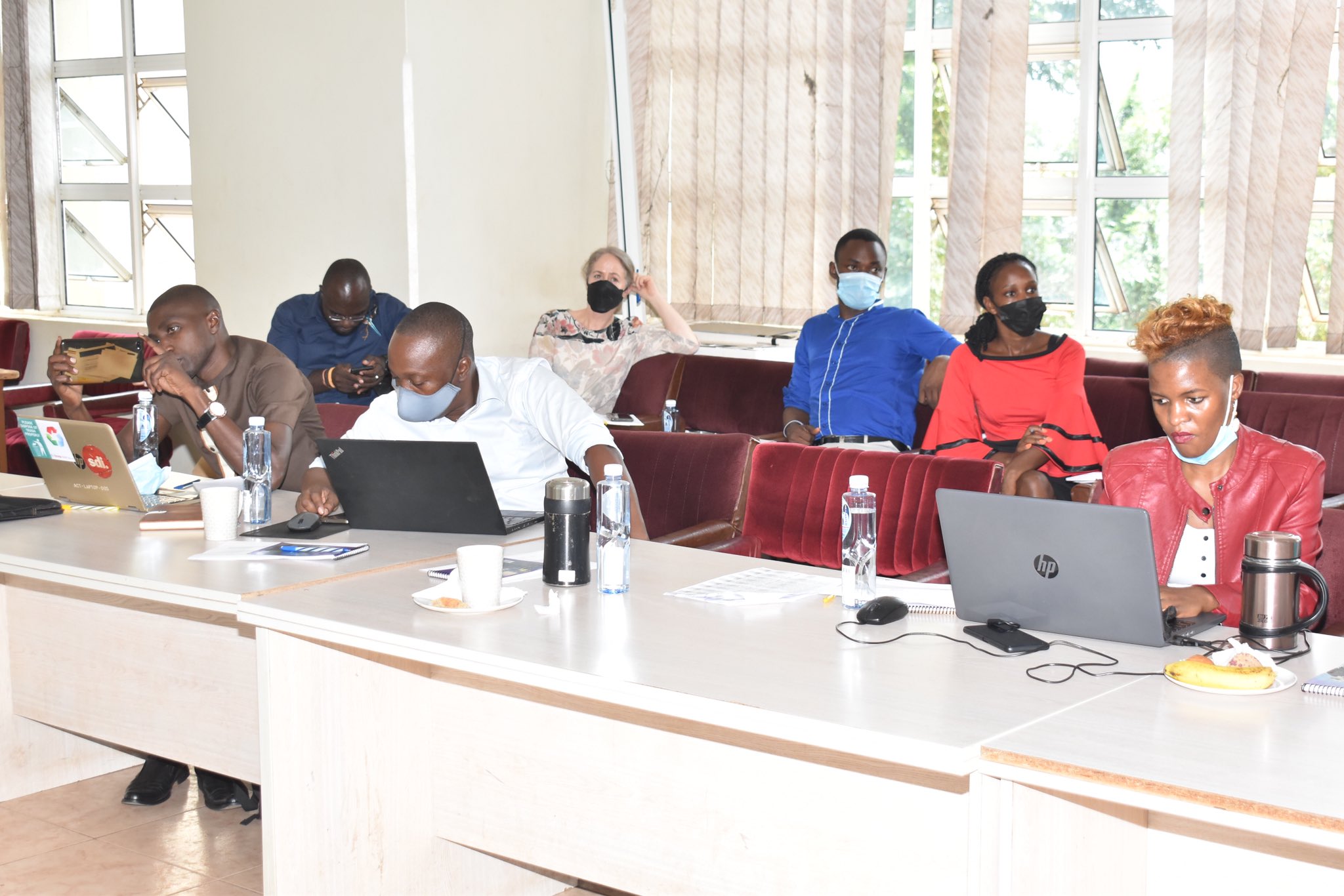
Globally, economies and societal sectors have been negatively affected by COVID-19 pandemic and its associated containment measures. In Uganda, lockdowns were put in place especially in Kampala as a way of containing spreader events. Makerere University represented by the Urban Action Lab in the Department of Geography, Geo-Informatics and Climatic Sciences, College of Agricultural and Environmental Sciences (CAES), in collaboration with the University of Manchester Global Development Institute and ACTTOGETHER-Uganda undertook a study titled: “Covid-19 Effects, Experiences and Responses in Informal Settlements and Commercial Zones of Kampala-Uganda”. The results of the study were presented by the team members during the International Symposium on Covid-19 Effects, Experiences and Responses in Informal Settlements and Commercial Zones of Kampala-Uganda held on 15th March 2022 at the College of Computing and Information Sciences’ Conference Room. The project was guided by three (3) main objectives including: (1) Understanding how the COVID-19 measures have amplified health, economic, occupational, and social risks, (2) Understanding the impact of lockdown measures with the increasing cases of COVID-19 infections, and (3) Exploring the experiences and consequences of the enforcement of measures in public places, the governance of these measures, the partnerships, and power-related tensions. The study analyzed collaborative coalitions that emerged as a response to handling the COVID-19 crisis in Kampala city.
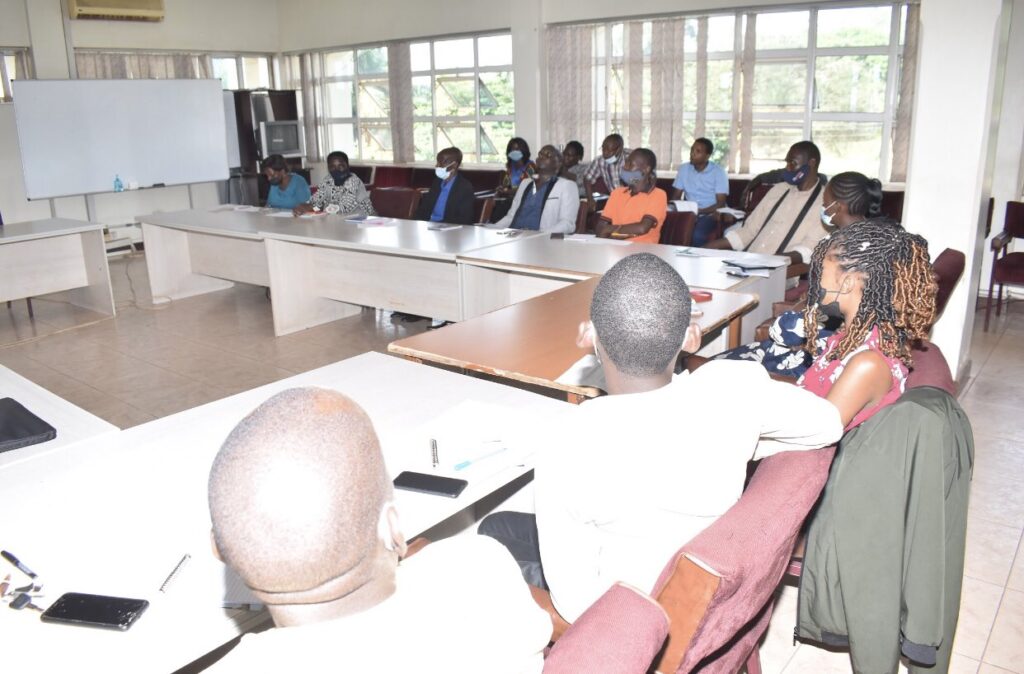
Issues Arising from the Symposium
1. The COVID-19 pandemic amplified the underlying urban planning and development inadequacies, mainly in the informal sector. It escalated challenges to food systems, WASH services, energy, transport, livelihood, and businesses enterprises, and heightened health risks and exposure to COVID-19. This was because the majority of the labourforce had to work from home which Increased psychological stress as a result of prolonged shutdowns, partial lockdowns, curfew, and restrictions to specific business establishments. According to Mr. Sseviiri Hakim from ACTTOGETHER, the pandemic negatively impacted Kampala informal settlements – the State measures were inadequate and collective action worked but still lacked.
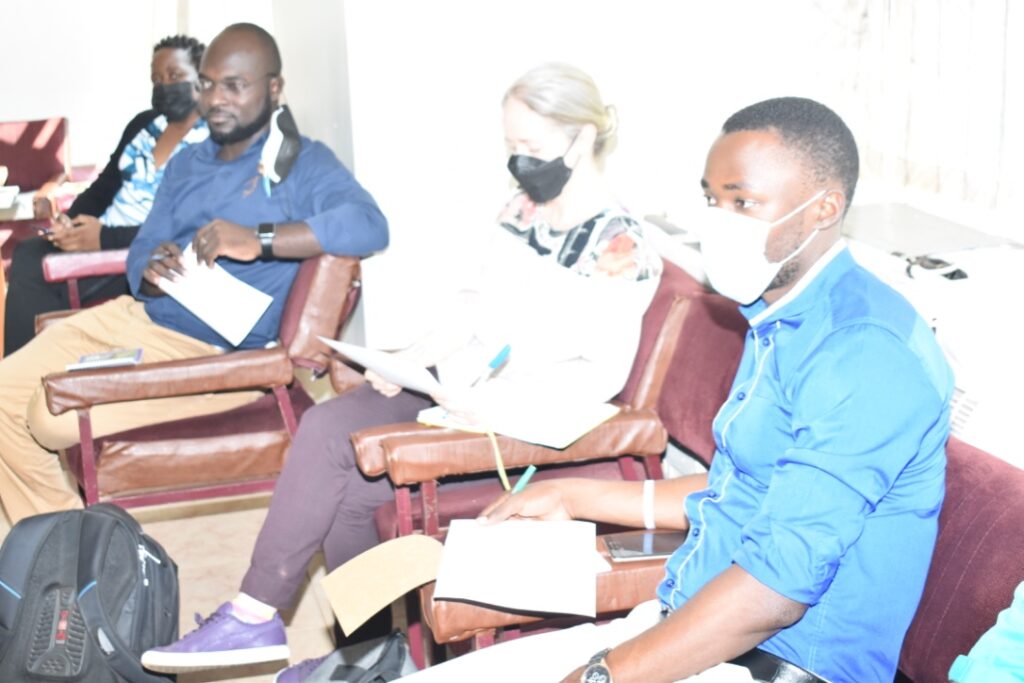
2. Makerere University College of Agricultural and Environmental Sciences’ researchers led by Dr. Paul Mukwaya discovered that it was impossible and financially unmanageable to implement comprehensive rescue packages in urban areas during the pandemic. Lockdowns and physical distancing were highly impractical for densely populated settlements and informal enterprises.
3. Kampala City is characterized by a rapidly growing population, with low-income settlements, mixed land uses and limited planning. The industrial sector is estimated at 80% with 60% GDP and the informal sector businesses at 90% with trade at 72%, manufacturing at 23% and services at only 6%. The rate of urbanization in Kampala has outpaced infrastructure investment and expansion capacity with under-serviced Informal settlements characterized by stretched education and healthcare systems. Private sector clinics and drug shops majorly dominate the health domain with the majority of low-income residents’ accessing health services from clinics and drug shops. The level of health services reflected negatively to the COVID-19 response and containment with few public hospitals and health centres providing health services to mostly the low-income earners.
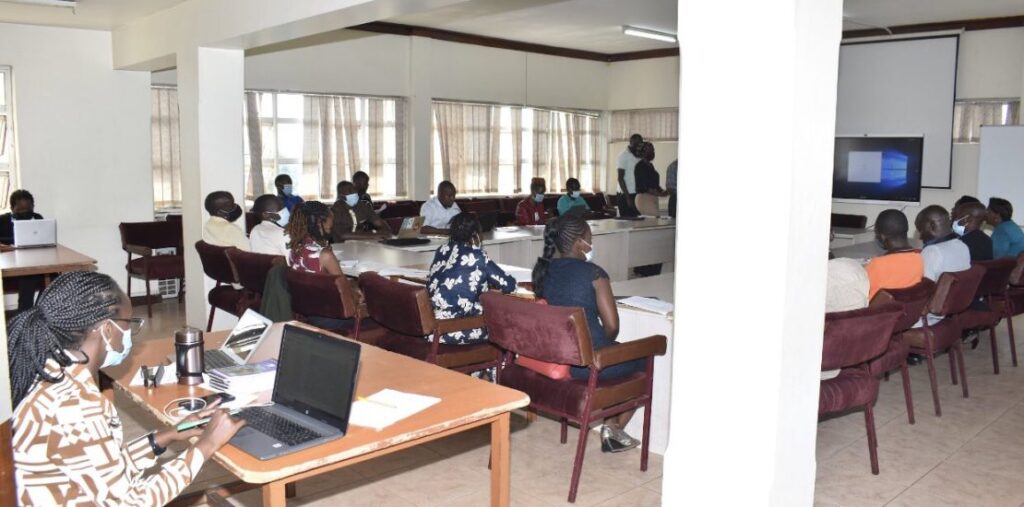
4. Government has done something as far as curbing the spread of COVID-19 is concerned. However there is need for self-assessment among people in order to stop criticizing the government on what it has done and what it has not done. There is need for Government to establish National food stores for food storage during the pandemic. There is also need for government to revisit allocations in the Parish Development Model (PDM) by programming instead of imposing since parishes are fewer compared to the people.
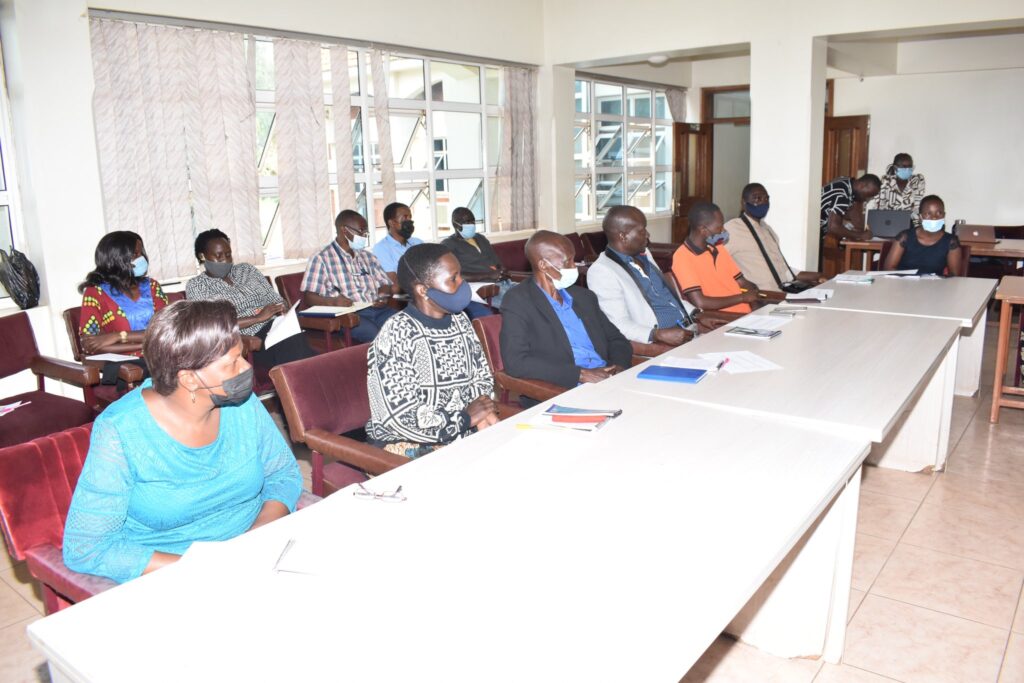
5. In regard to efforts geared towards financial recovery from Covid-19 effects, Mr. Mwanje Nicholas, Kinawataka Zone, urged citizens to opt for financial inclusion especially by saving with Saccos. He encouraged social service pillars aimed at getting data from communities to take care of special interest groups through mindset change and physiological approach.
6. COVID-19 and its measures have globally affected economies. Mr. Ssevviri Hakim noted that the health, economic and social risks were amplified by COVID-19. “There is need to support community-led Initiatives through enhancing the capacity of existing structures. Communities need to work together as well as learn to acknowledge the contribution of others in the fight against the pandemic.
7. According to Mr. Lubega Idiris, vendors were allowed to sleep in markets during the pandemic but the markets barely had the necessary structures. Mr. Lubega urged Government to facilitate the pro-activeness of local level coalitions through provision of accurate information, resources in form of finance and equipment, building synergies for transformational actions and collaborations
8. Mr. Kasaija Peter, a PhD student in the Department of Geography, Geo-Informatics and Climatic Sciences encouraged the team to put in place an engagement system were researchers can engage with different stakeholders in order to ensure continuous growth of communities even after the COVID-19 pandemic.
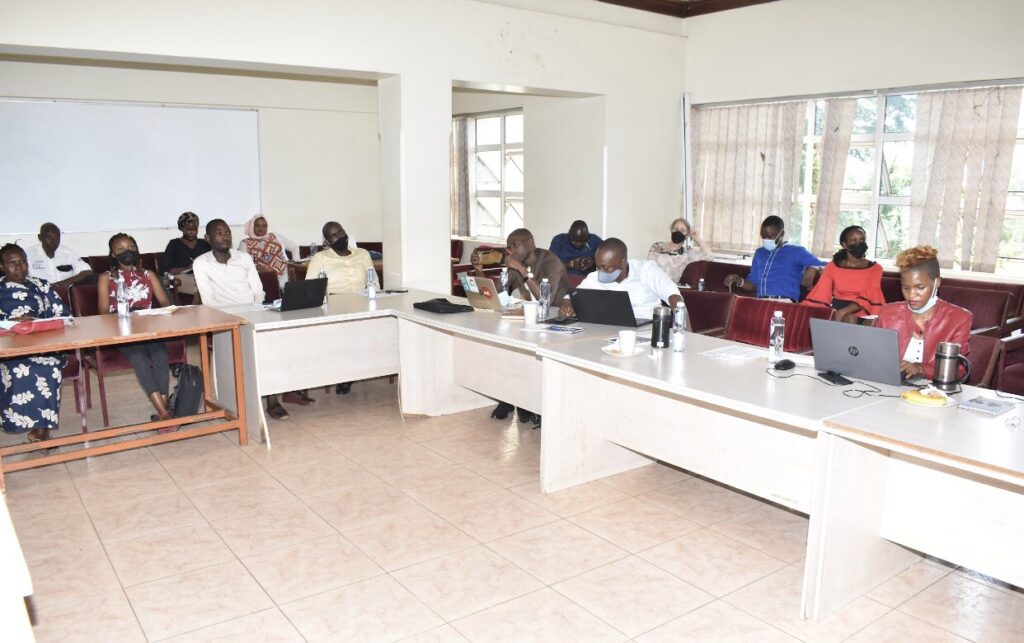
Approach and Methods
The project team applied Participatory research approach with mixed methods- (Academia, ACTogether, NSDFU, local administrative structure); Focus group discussions (FGDs), (30 FGDs- informal business enterprises, settlement residents, local leaders, COVID-19 taskforce or team members, transport operators, and social service providers) and Key informant interviews (KIIs)- CSOs, KCCA technocrats and politicians, Document reviews, and Videography.
COVID-19 Trends and Implementation Taskforce
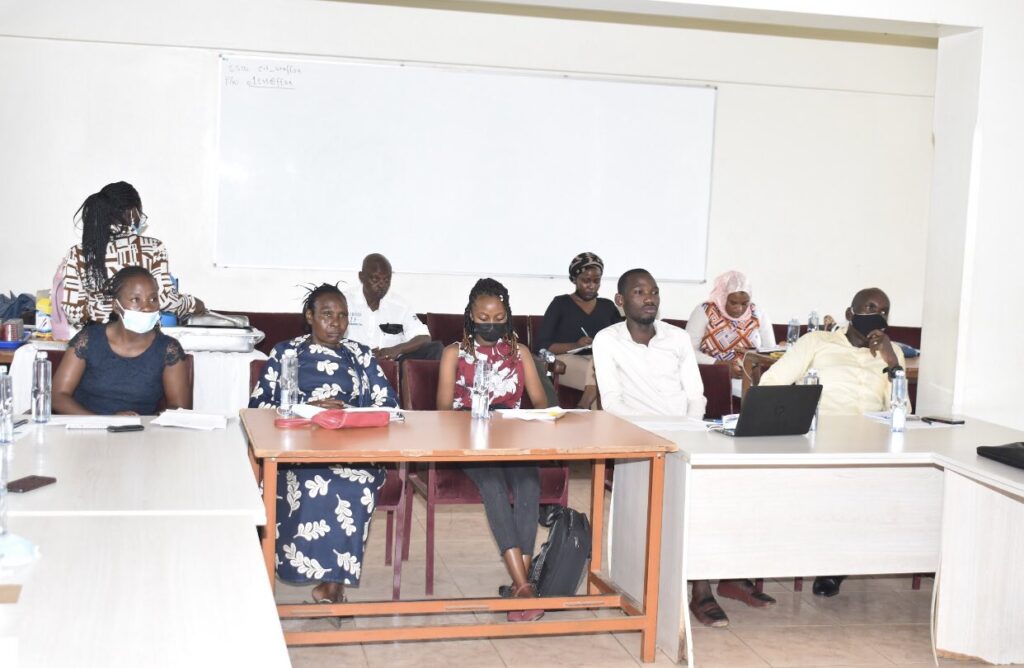
The first COVID-19 case was identified on 21st March 2020 in Uganda. COVID-19 cases went on increasing from 52 cases in April 2020 to 123,742 cases by October 2021 and 98% of these were through local transmissions and only 2% of the cases were imported, with 3,161 deaths registered in the country. The country had two prolonged total lockdowns, with selective lockdowns in the education sector for over 16 months. 24.5% of the population in the central business district was highly vulnerable (shopping malls, transactional offices and transport hubs), with 47.3% moderately vulnerable and 38.2% having the lowest level of vulnerability.
The city and division taskforce against COVID-19 were coordinated by KCCA, with support from the ministry of Health, private sector and several development partners including AMREF and URCS. These enforced the presidential directive, set up divisional rapid response surveillance teams, dedicated 90% of the city’s centres to covid-19 emergencies, provided hand washing and hygiene facilities, built capacity of VHT’s, did community sensitization etc. VHT’s provided first aid, raised awareness and direct links to emergency response services through toll free communication channels. Tracked, reported and facilitated the evacuation of suspected cases.
COVID-19 Response and Social protection
Government rolled out a food distribution programme in early April 2020 were families were given 6 Kgs of maize flour and 3 Kgs of beans per household. However, 75% to 95% of the residents in their respective settlements received food relief from government. The Food distribution mechanism had Irregularities including: supply of substandard and less nutritious foods to vulnerable populations; High and middle-income households given food relief in contrast to the targeted low-income household; Alienation of opposition supporting households; No accountability to all food kinds donated to the NTF. Government also distributed facemasks to help curb the spread of COVID-19 pandemic. However the facemasks were of poor quality and of small sizes. Regarding the promise of economic recovery packages through UDB, there were no clarifications on how the informal sector could access such funds. Government also launched a cash transfer initiative during the second wave of the pandemic i.e., (UGX. 100,000 or USD 27.7) but less than 50 households received cash in a parish.
COVID-19 Socio-Economic and Health Impacts
The pandemic amplified urban inequalities and chronic poverty due to job loss and wage reduction. Livelihoods changed due to increased food and energy prices and closure of Informal businesses. The pandemic also increased the exposure of food selling vendors to the risk of arrest and confiscation of their goods on city streets. There was widespread food insecurity which forced families to reschedule feeding patterns, the quality of food eaten, dietary intake and number of times eaten in a day.
During the first and second phases of lockdown, there was restriction in public transport. The lockdowns and suspension of public transport services disrupted access to healthcare. The bans on public transport led to the spike in the cost of access to healthcare. This was worsened by the incapability of Uganda’s health services to adequately respond to the crisis with many public hospitals lacking enough equipment.
Landlords were reluctant to provide toilet-emptying services and female headed households and youths were unable to pay for water and sanitation facilities which increased the rate of open defecation by residents. During the pandemic, there was improved hygienic conditions due to increased adherence to hand washing and hand sanitization.
Recommendations for addressing future related Pandemics
- There is need to harness the local intelligence of communities to address the long-term challenges faced by slum dwellers.
- There is also need to coordinate communication, planning, decision-making, and operations across a wide range of stakeholders in cities for future response.
- Government should engage: Civic groups, CSOs, local leaders, cultural and religious institutions in case of crisis because they are key in mobilizing and gaining trust in the community and are much trusted by residents than government messaging and policies.
- Coordination mechanisms for targeted responses should be put in place and flexibly changed based on prevailing contexts and a full communication cycle should be embraced and implemented.
- Strong partnerships are key to unlock the potential benefits of collaboration between these complementary people-centered approaches.
- Identifying and supporting community-led solutions for bringing the outbreak under control facilitates people’s active participation in the response.
You may like
-
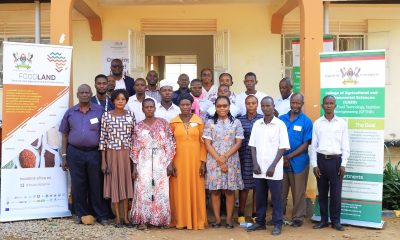

FoodLAND Project Research Dissemination: Nakaseke District Farmers Sensitized on Modern Agricultural Practices & Proper Nutrition
-
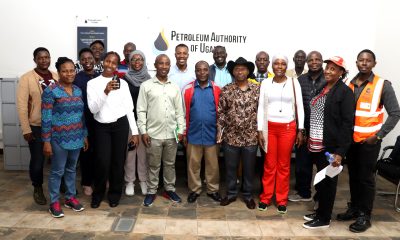

Mak Environmental Economists Explore Uganda’s Albertine Oil Fields: Identifying Research and Collaboration Opportunities
-
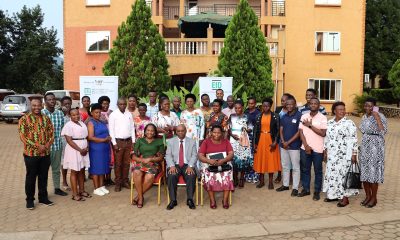

EfD Hosts Policy Dialogue on Energy Efficiency and Reduced Emissions: Hoima Residents Call for Expanded Access to Clean Energy
-
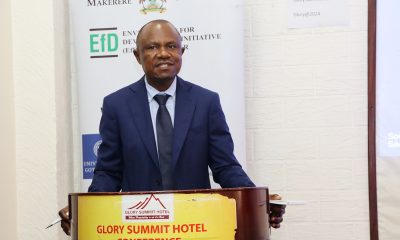

EfD-Uganda Holds Inaugural AGM: Celebrates Milestones and Outlines Future Plans
-
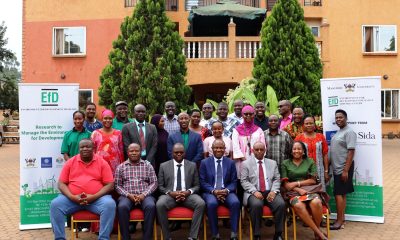

EfD Uganda AGM Endorses Professors Edward Bbaale and Johnny Mugisha for Directorship
-
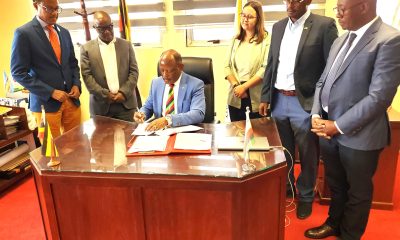

Mak, Oregon State University Sign Cooperation Agreement
Agriculture & Environment
FoodLAND Project Research Dissemination: Nakaseke District Farmers Sensitized on Modern Agricultural Practices & Proper Nutrition
Published
4 days agoon
July 23, 2024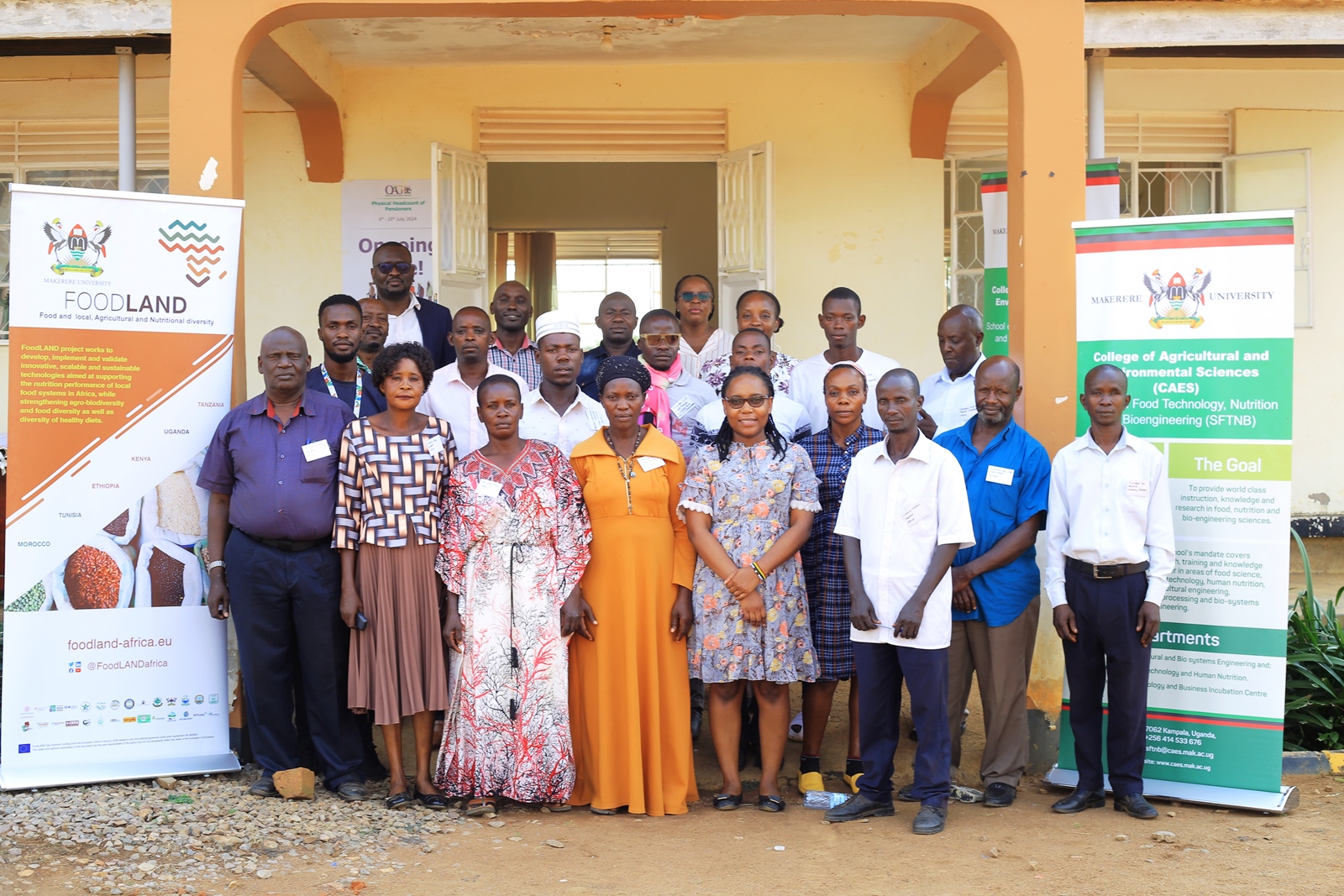
******Food and Local, Agricultural, and Nutritional Diversity (FoodLAND) project aims to develop, implement and validate innovative, scalable, and sustainable technologies aimed at supporting the nutrition performance of local food systems in Africa, while strengthening agro-biodiversity and food diversity as well as diversity of healthy diets.
Experiences of Nakaseke District farmers
Farmers in Nakaseke District are indebted for the support and training received from the FoodLAND Project. Although many had been engaged in the activity, they lacked knowledge and skills of modern farming. Connected to FoodLAND through VEDCO, a non-governmental and not for profit agricultural organization, the farmers have acquired skills on value addition, precision irrigation/fertigation, smart storage systems, gardening and hydroponics systems, biodegradable mulching, precision crop protection systems, precision harvesting systems and agro-ecological intensification practices.
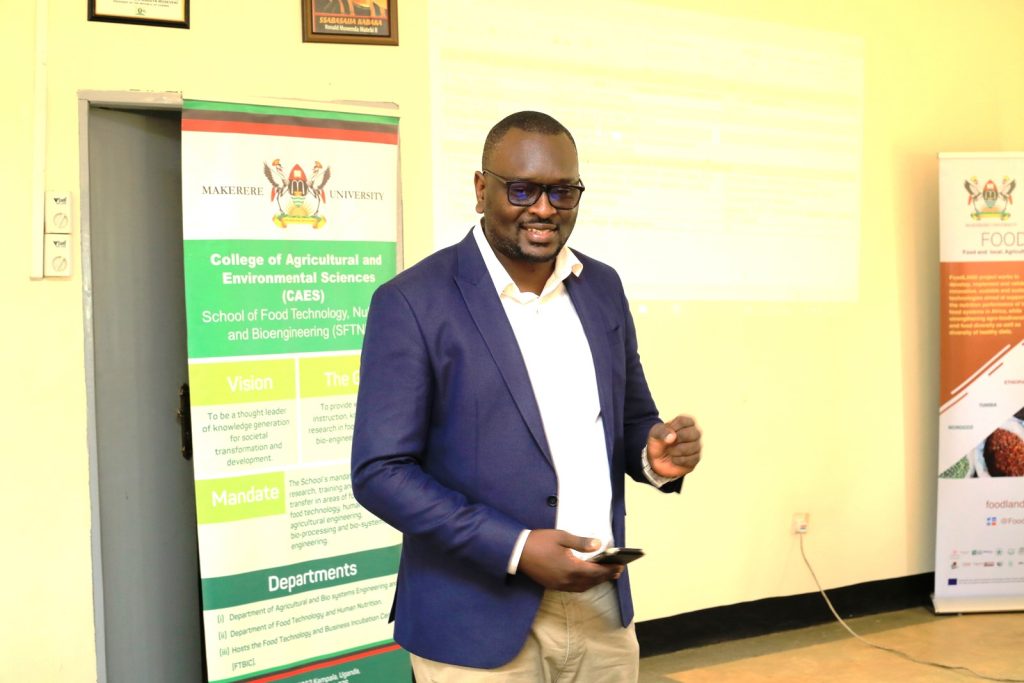
According to Ms. Nakawuba Sarah, a widow and tomato farmer in Kapeeka Sub County, Nakaseke District, the knowledge acquired has enabled her to expand, and gain more profits. “I extend my gratitude to FoodLAND and the funders of the project. The knowledge acquired over time has enabled me to expand my farm and earn more money. Due to ignorance, we used to be exploited – people would buy our products cheaply because we lacked knowledge of preservation. The training on value addition has helped us learn how to preserve our products and we are now benefiting more from them. At the time my husband died, we had just a small house built on his father’s land. I am happy that with the support received from VEDCO and FoodLAND, I have bought a plot of land, built a house, and I am able to pay school fees for my children. I once again thank VEDCO and the FoodLAND. Although the FoodLAND project is ending soon, I request that they do not leave us. They should continue training us so that we further improve our skills.”
Mr. Lubowa Samuel Sunday, also a farmer in Kapeeka Sub County, Nakaseke District is equally grateful. Through FoodLAND, several farmers in Nakaseke District have acquired knowledge of climate smart agriculture. “Farming in the dry season is no longer a challenge. Our harvest has increased and we are now earning more. However we still face a number of challenges including the high cost of fertilizers and pesticides. We appeal to the project team to conduct more research on natural remedies for the challenges we are experiencing.”
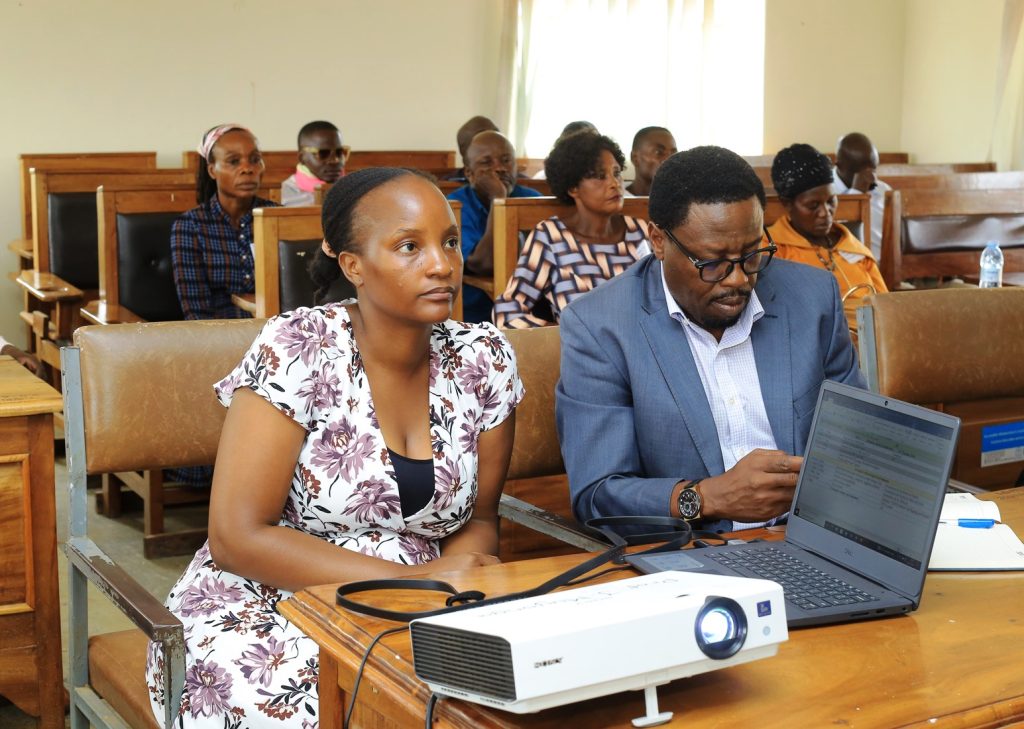
Ms. Nankya Jane, a coffee and banana farmer Semuto Sub County, Nakaseke District, the irrigation skills acquired through the project have greatly improved her farm. “The place where I do my farming was so dry, and this, in many cases, affected my yields. Through VEDCO, we were taken to the Makerere University Agricultural Research Institute Kabanyolo (MUARIK) where we acquired skills on proper irrigation and value addition using technologies developed by the FoodLAND Project. If I had acquired these skills when I started 7 years ago, I would be very far. My appeal is that you continue offering training to us. There is a lot more that we need to learn.”
About the FoodLAND project
Launched in 2020, the main objective of the FoodLAND project was to develop, implement and validate innovative, scalable and sustainable technologies aimed at supporting the nutrition performance of local food systems in Africa, while strengthening agro-biodiversity and food diversity as well as diversity of healthy diets.
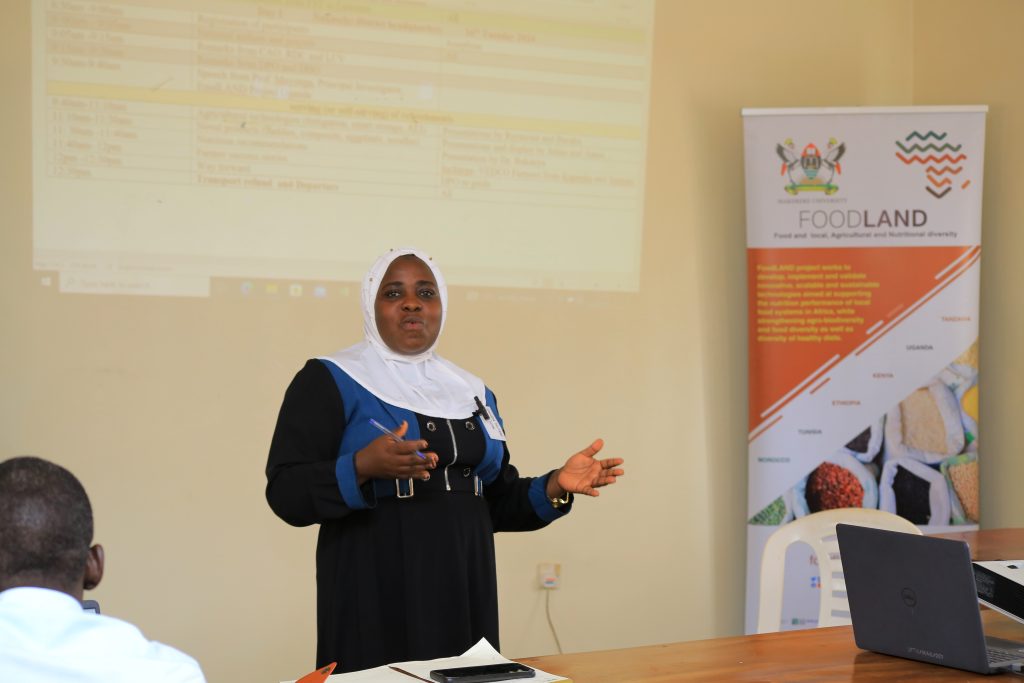
Funded to the tune of 7 million euro by the European Commission within the Horizon 2020 programme, and led by Alma Mater Studiorum – University of Bologna (Italy), the project committed to developing a range of innovations for local agriculture and aquaculture development, as well as to nudging consumers towards healthier eating behaviour in six African countries: Morocco, Tunisia, Ethiopia, Kenya, Uganda and Tanzania. The project specifically aimed to empower smallholder farmers and food operators, foster nutrition responsive and sustainable agro-biodiversity, reinforce the productivity and resilience of food supply chains, and create new market opportunities at both the local and global scales, thereby encouraging the flourishing of rural communities. The project was envisaged to create a network of 14 local Food Hubs—paired with 14 separate cities in these countries—that would mobilise relevant actors in rural, urban and peri-urban communities and serve as injection points for testing and introducing the innovations. The 28 partners that comprise the FoodLAND consortium (18 of them African institutions while the other 10 are European) were expected to work together to develop, implement and validate 12 technological innovations; which include organizational and technological innovations for both vegetable and fish farming and food processing systems, together with 17 novel local food products, ranging from fresh, dried and processed vegetables and fish to composite flours and therapeutic foods.
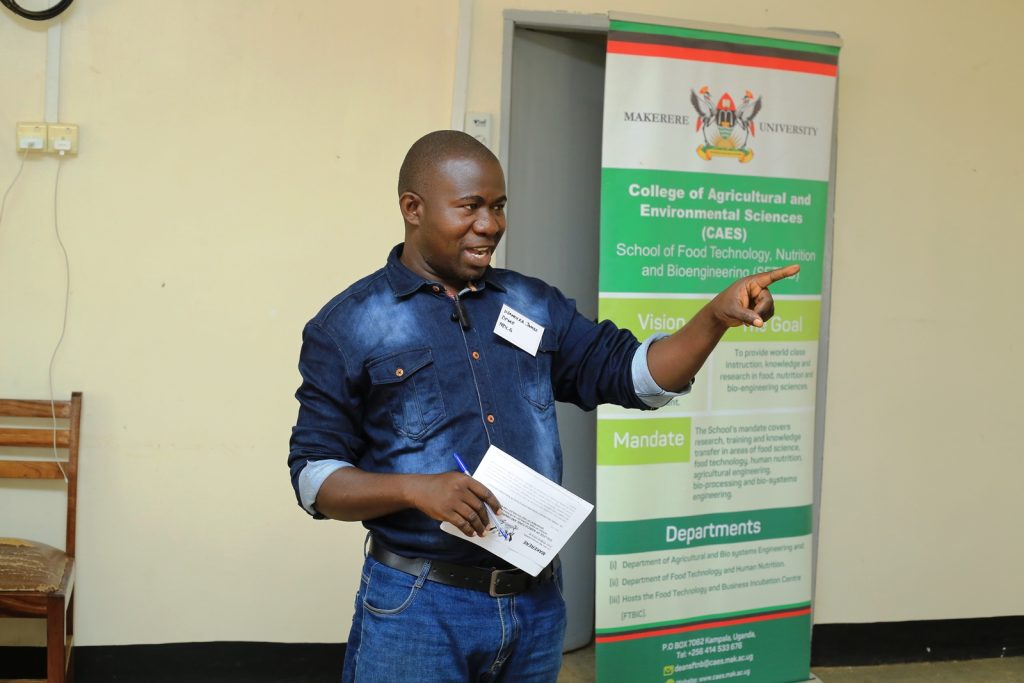
In Uganda, the project was implemented in 6 districts namely; Masaka, Nakaseke, Kamuli, Lwengo, Mukono and Wakiso, and was led by Prof. John Muyonga from the Department of Food Technology and Nutrition, College of Agriculture and Environmental Sciences (CAES), Makerere University. Other members on the project were: Prof. Johnny Mugisha from CAES; Dr. Cassius Aruho, Dr. Puline Nakyewa, Dr. Margaret Masette, Dr. Getrude Atukunda and Dr. Justus Rutaisire from NARO; Mr. Henry Nsereko from VEDCO; and Prof. Dorothy Nakimbugwe from Nutreal.
To date, the project team in Uganda has registered a number of achievements including;
- New nutrient enhanced food products – Noodles containing orange fleshed sweet potatoes and biofortified beans; instant flours containing orange fleshed sweet potatoes, biofortified beans and grain amaranth; and dry eggplant. Arrangements are in place for commercialization of the technologies by SMEs.
- Establishment of infrastructure at MUARIK for research and training on fertigation (irrigation that supplies water together with manure) and precision irrigation.
- Development of technology for smart cold storage of perishable foods such as fruits and vegetables. The technology allows for remote monitoring of temperature and relative humidity.
- Development of technology for rodent control in stores. This technology has been shown to be effective in preventing of rodent damage to food in stores.
- Promotion of agro-ecological intensification – Applying ecological principles to ensure sustainable agricultural production.
- Testing application of bio-based packaging of food
- Training of 100 farmers in different production technologies.
- Training of 3 M.Sc.
- Developing of nutrition guidelines for adults and the elderly.
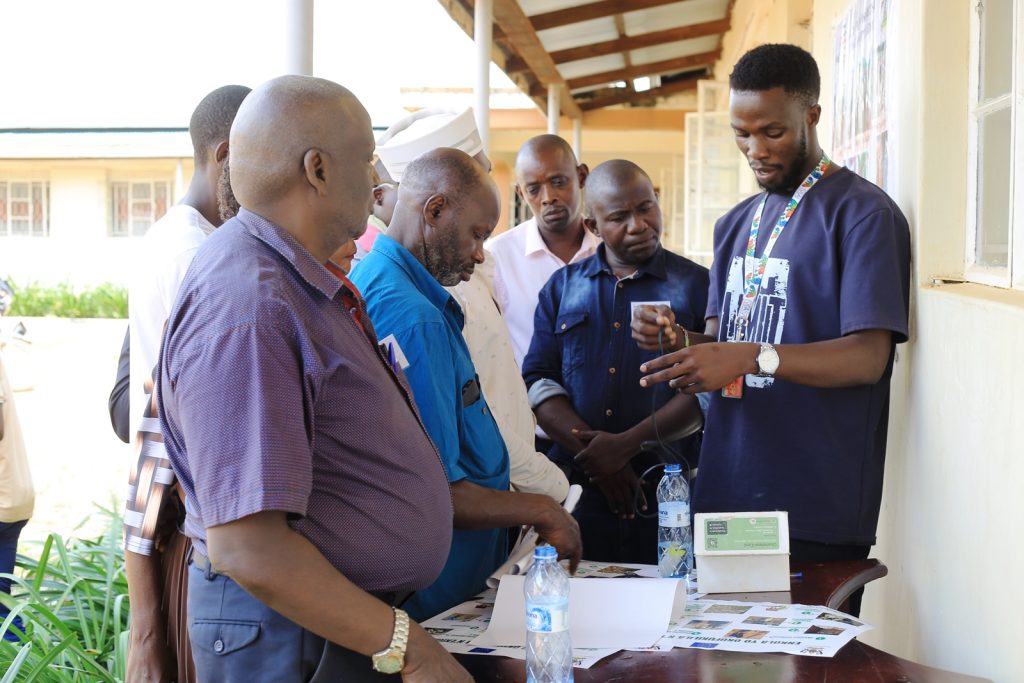
Dissemination of the project findings and achievements to farmers and district leaders in Nakaseke
On 16th July 2024, the project team held a dissemination workshop for Nakaseke District leaders and farmers to sensitize them on different aspects including the research findings and recommendations for improved farming practices. Coordinated by Ms. Josephine Kisakye, and conducted at Butalangu District Headquarters, the workshop was attended by representatives of farmer groups in Nakaseke as well as the district officials, including the CAO, DHO, DPMO and RDC. On behalf of the Project Coordinator, Dr Richard Bukenya, also a member of staff in the Department of Food Technology and Nutrition briefed the farmers on the findings of the project, highlighting the project objectives and progress made thus far, including the technologies, novel raw materials, ingredients and food products developed. Under the project, a number of technologies for smart farming have been developed and are being tested. These include: Digital tools for precision agriculture, farming management systems like the rodent control system as part of smart storage systems, and the food processing systems like the solar drier.
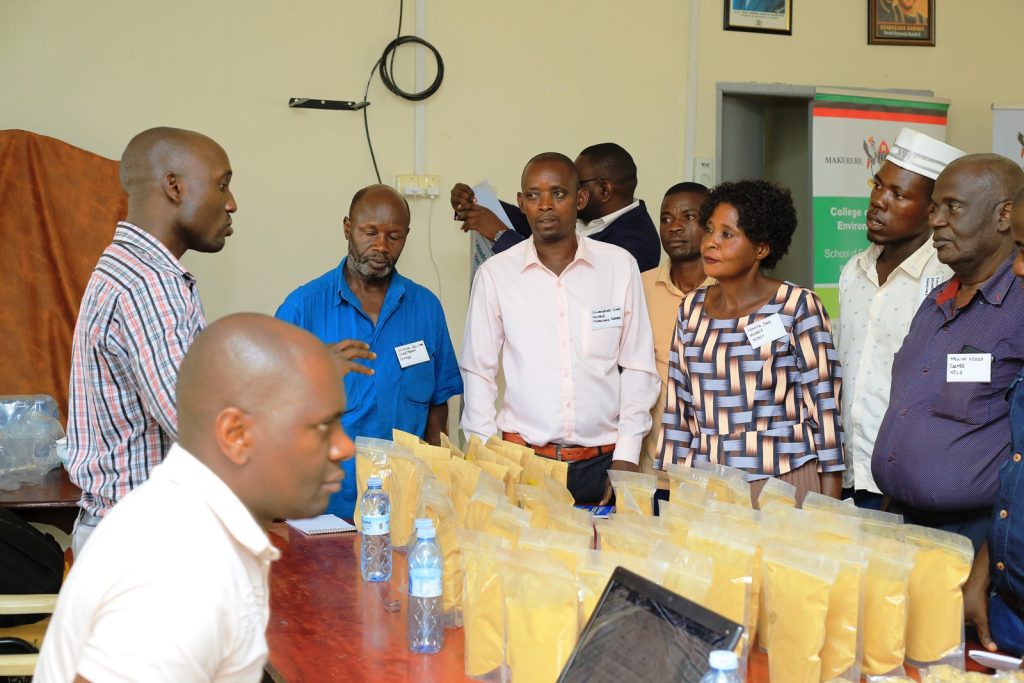
During the workshop, Mr. Barak Price, a student on the project sensitized participants on the rodent control system. He also trained the farmers on precision irrigation/fertigation. The farmers were also taken through the processes of value addition. Ms. Josephine Kisakye, a researcher on the project discussed the nutrition recommendations developed by the project. In the course of the project activities, it was noted that diets in Uganda are mainly composed of starchy staples, especially cereals, roots, tubers and bananas, with legumes constituting the main protein source. Intake of micronutrient-rich foods is low, despite various interventions to promote consumption of fruits, and vegetables. Ugandan adult and elderly population in both rural and urban areas were found to be at risk of under-nutrition and micro-nutrient deficiencies. Nutritional recommendations included: i) Daily consumption of locally available fruits and vegetables, whole starchy staples, and protein-rich foods; including beans, peas, nuts, fish, eggs, and meat; ii) Limiting the consumption of fried foods, salt, alcohol, and sweetened beverages; iii) Hydrate with fluids, preferably water; Regular engagement in moderate-intensity physical activity like brisk walking, digging, swimming, aerobics, and cycling; vi) Undertaking medical examination at intervals of no longer than 6 months to facilitate timely detection and treatment of ailments like diabetes, hypertension, high plasma cholesterol and cancers.
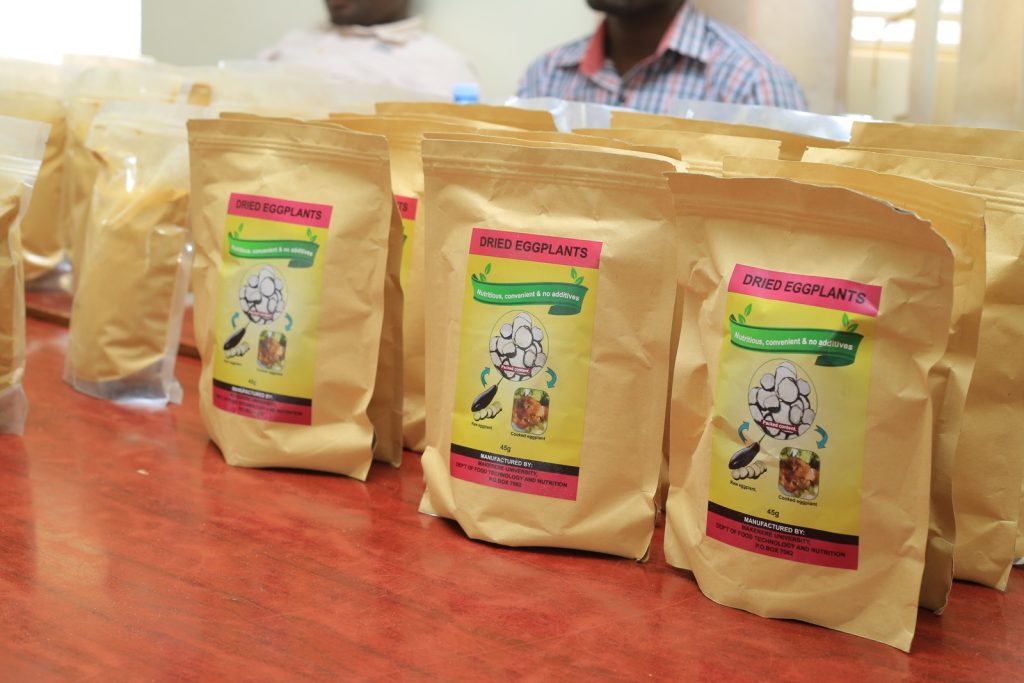
Appreciation by the District officials
Butalangu Town Clerk, Ms. Rashida Mutebi on behalf of the Chief Administrative Officer appreciated the project for reaching out and working with the local communities to improve their livelihoods. “The trainings on value addition will go a long way in saving our farmers losses,” she noted, calling for resilience and cooperation amongst the farmers. “It is important that you work together. Always share best practices if you are to improve yourselves and gain more from farming. I also implore you to always keep records of your farming activities.”
In his remarks, Nakaseke District Health Officer, Dr Alija Simon noted that the challenge of non-communicable diseases was on the raise due to poor feeding habits. He expressed gratitude to the project for incorporating the important aspect of nutrition in its research.
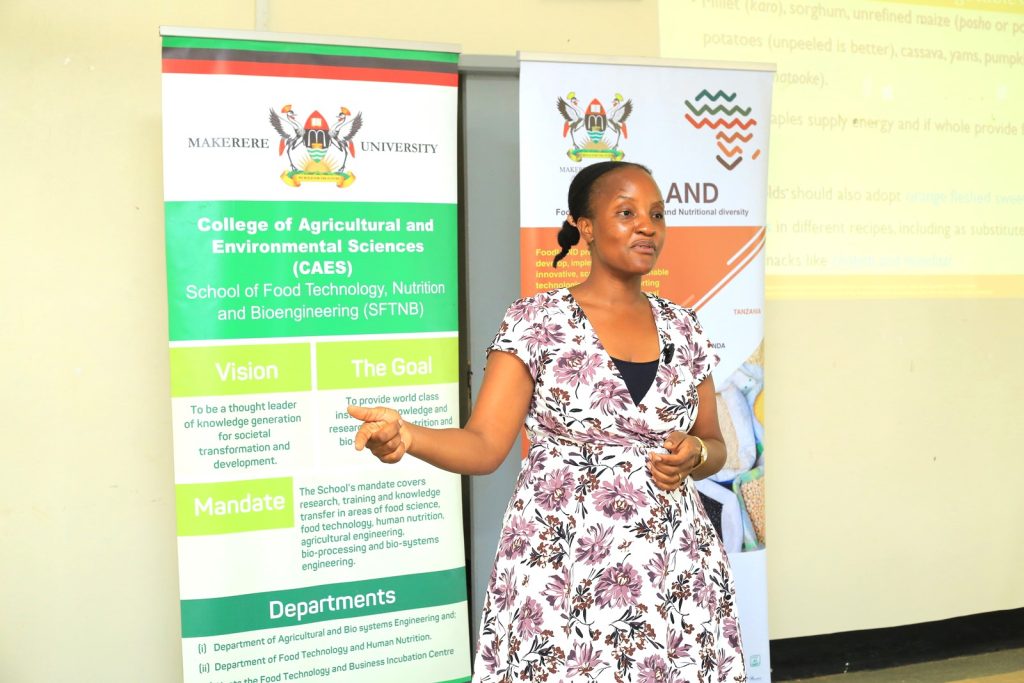
DPMO Wandera James appreciated the Government of Uganda for investing in farming. He also appreciated the project team for the trainings offered to the farmers in the district, noting that value addition was a key area of focus in the Parish Development Model. “Nakaseke is now becoming a food hub. I thank Makerere University for working with the communities. Initially, research was done but stopped in the shelves of the University. We are happy that you are now working with the communities to identify solutions to the challenges undermining agriculture. Research should be conducted for development.”
Addressing participants, the Assistant RDC, Nakaseke District, Mr. Muhoozi Michael appreciated Makerere University, specifically the FoodLAND Project, calling for more innervations to support farmers in the district out of poverty. He implored the farmer groups to form a cooperative, noting that the latter forms a better platform for soliciting support.
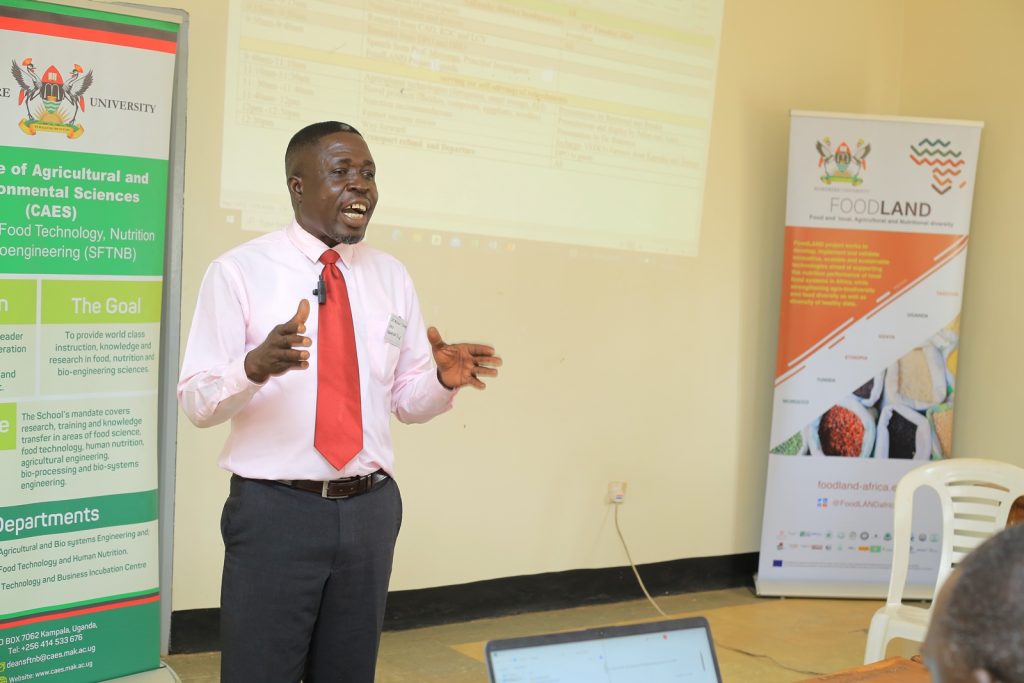
A similar dissemination exercise was conducted in Kamuli District in Eastern Uganda.
More photos from the FoodLAND project Nakaseke Dissemination
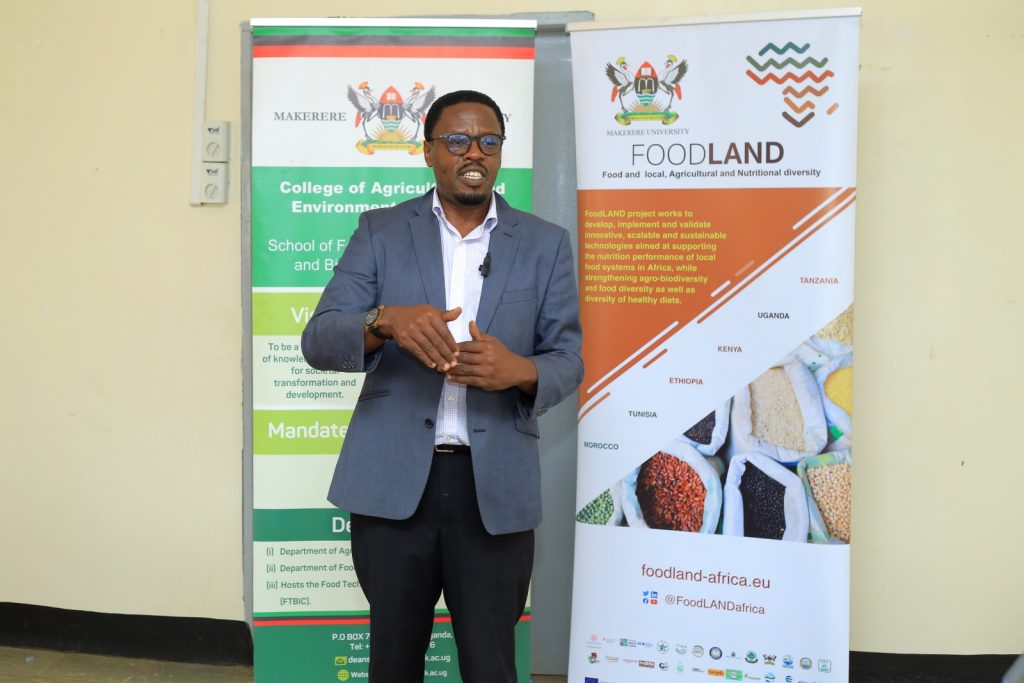
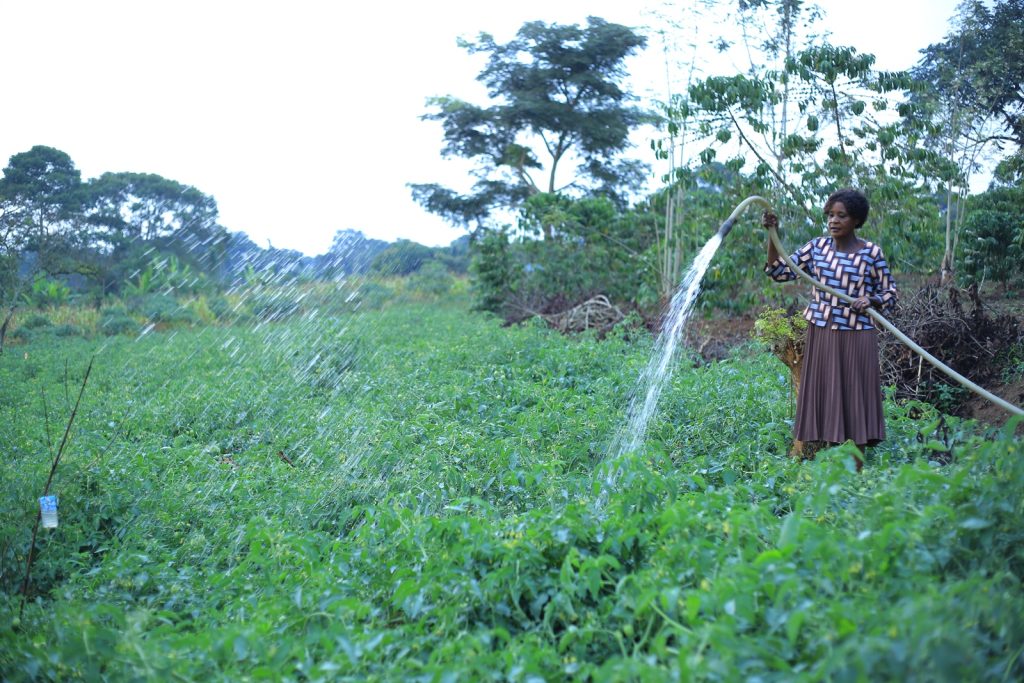
Agriculture & Environment
Mak, Oregon State University Sign Cooperation Agreement
Published
1 week agoon
July 19, 2024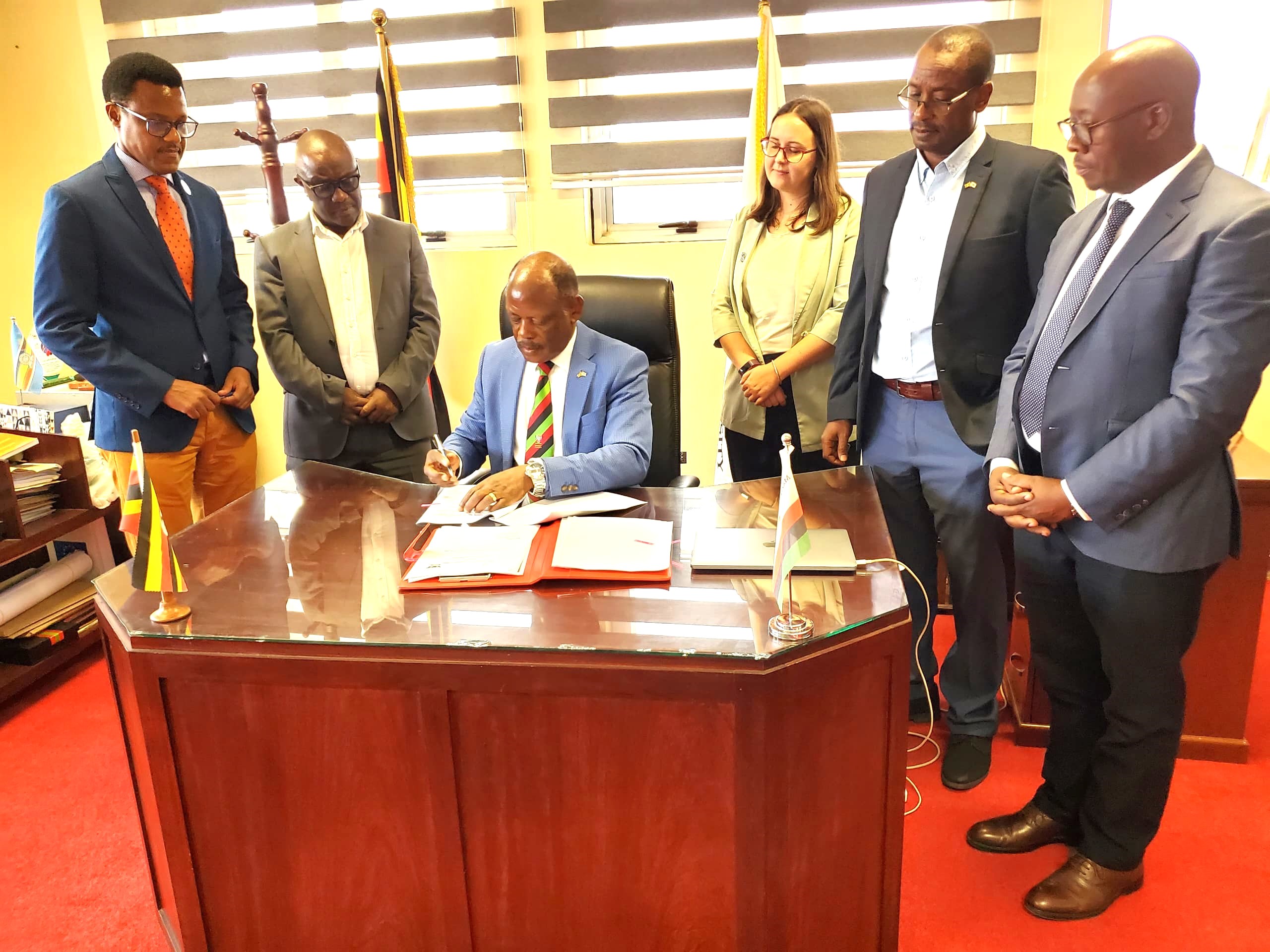
Makerere University Vice Chancellor, Prof. Barnabas Nawangwe on 19th July 2024 endorsed the Memorandum of Understanding between Makerere University and Oregon State University to collaborate in different aspects of academics. The MoU signing ceremony was witnessed by members of staff from the College of Agricultural and Environmental Sciences (CAES) namely; Dr Revocatus Twinomuhangi, Dean, School of Forestry, Environmental, and Geographical Sciences; Dr Lawrence Orikiriza Head, Department of Forestry, Biodiversity and Tourism; and Prof. Jim Ayorekire from the same department. Oregon State University was represented by Dr Ian E. Munanura, an Associate Professor in the Department of Forest Ecosystems and Society, College of Forestry, and Ms. Racheal Fahrenbach, Manager International Programs at the College of Forestry. At Makerere, the MoU will be implemented by the Department of Forestry, Biodiversity and Tourism under the leadership of Prof. Jim Ayorekire. At Oregon State University, it will be implemented by the College of Forestry.
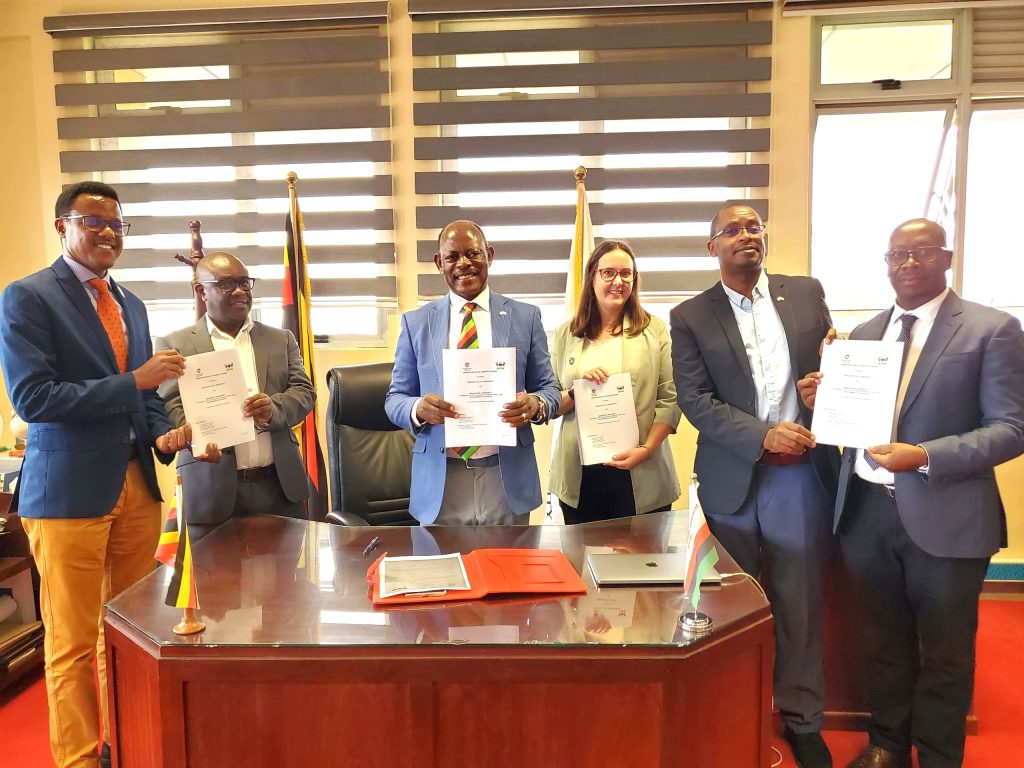
Under the MoU, the two institutions have agree to mutually promote the following programmes, based on their respective academic and educational needs; i) Exchange of scholars and faculty staff, ii) Exchange of undergraduate and graduate students for research and study, iii) Exchange of academic information and materials, iv) Joint research activities and publications, v) Participation in conferences and academic meetings vi) Joint running of short-term academic programs, vii) Resource mobilization in respect of areas of mutual interest, and any other areas which may promote their mutual interests.
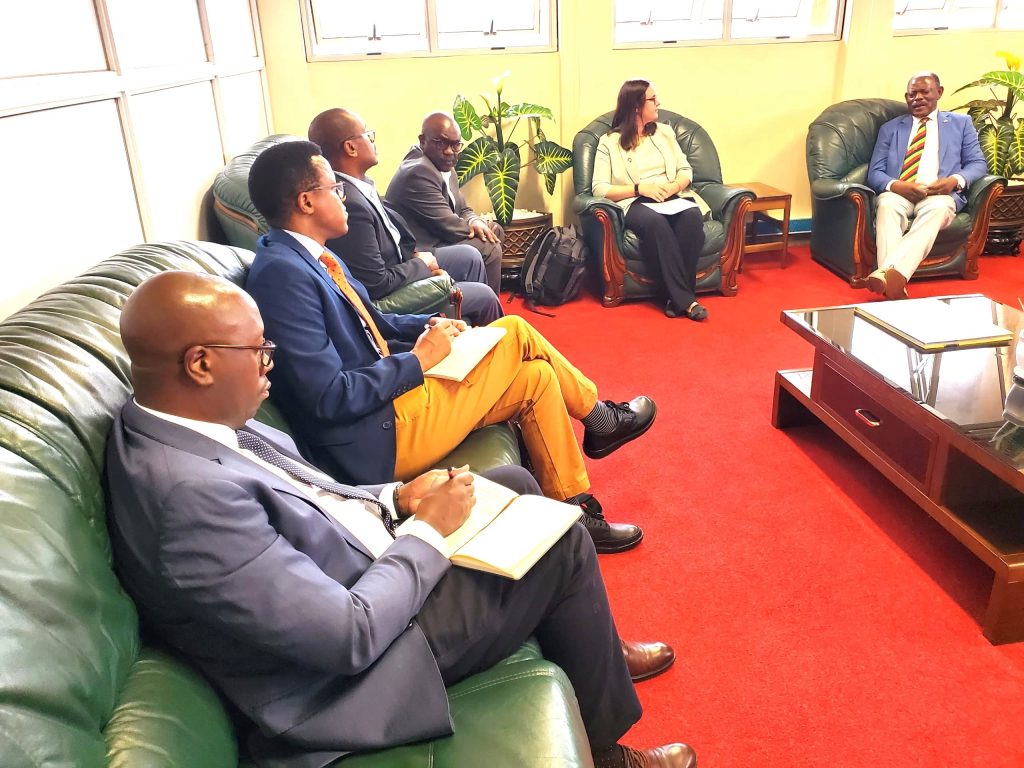
During the ceremony, the Vice Chancellor noted that programmes agreed on in the MoU were in line with the University’s Strategic Plan, and would greatly advance Makerere’s aspiration to become a research-led University. “As we move towards becoming a research-led University, we aim to contribute to the realization of Agenda 2063 which seeks to have Africa produce at least one million PhDs as one of the measures to eradicate poverty from the continent. Partnerships like this will help us achieve our target, by building our supervision capacity,” he explained, pledging support towards the implementation of the MoU.
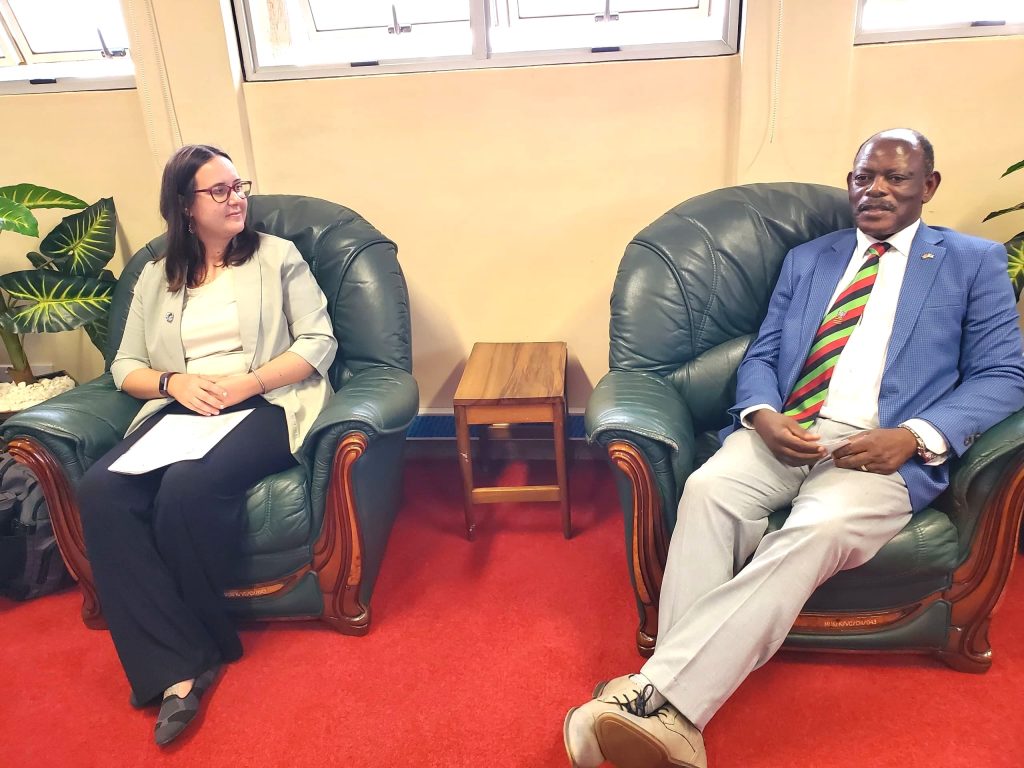
Dr Ian Munanura on behalf of Oregon State University expressed gratitude to work with Makerere, noting that the partnership would strengthen research capacity of the two institutions and support the mentorship of the next generation of scientists to deal with the challenges facing humanity including climate change and unemployment.
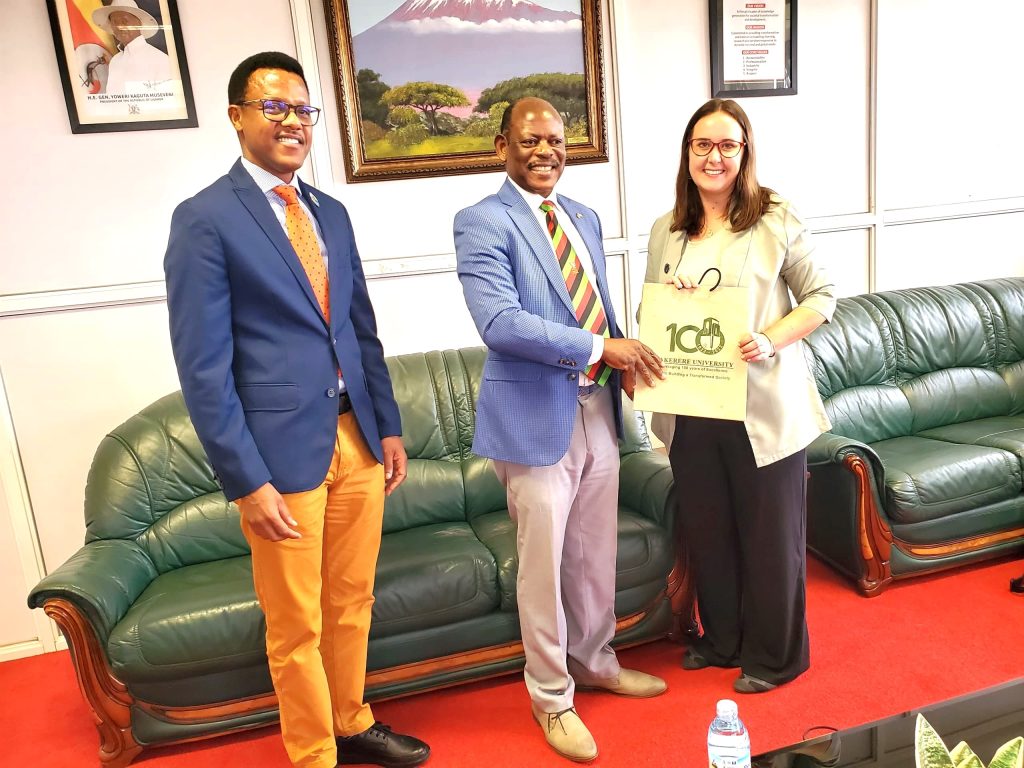
About the Department of Forestry, Biodiversity and Tourism at Makerere
The Department of Forestry, Biodiversity, and Tourism under the School of Forestry, Environmental, and Geographical Sciences at the College of Agricultural and Environmental Sciences, Makerere University offers programmes namely; Bachelor of Science in Conservation Forestry and Products Technology; Bachelor of Social and Entrepreneurial Forestry; and Master of Science in Agroforestry. Specific courses offered under those programmes include; Agroforestry Systems, Practices And Technologies; Drylands Agroforestry; Advanced Community Forestry; Gender Issues In Forestry; Advanced Biodiversity Conservation; Ecophysiology and Agronomy; Forestry For Rural Development; Natural Resource Management; Tropical Forest Ecology And Management; Forestry Business Management; Entrepreneurship In Forestry; Forestry And Food Security; Indigenous Knowledge in Resource Management; Biomass Energy Production and Conservation; Land Use Planning and Watershed Management; Forest Planning and Development; Forest Ecosystems and Livelihoods; and Forest Planning and Development. The Department also conducts a wide range of research in the fields highlighted above. The training offered exposes graduates from the department to a wide range of employment opportunities.
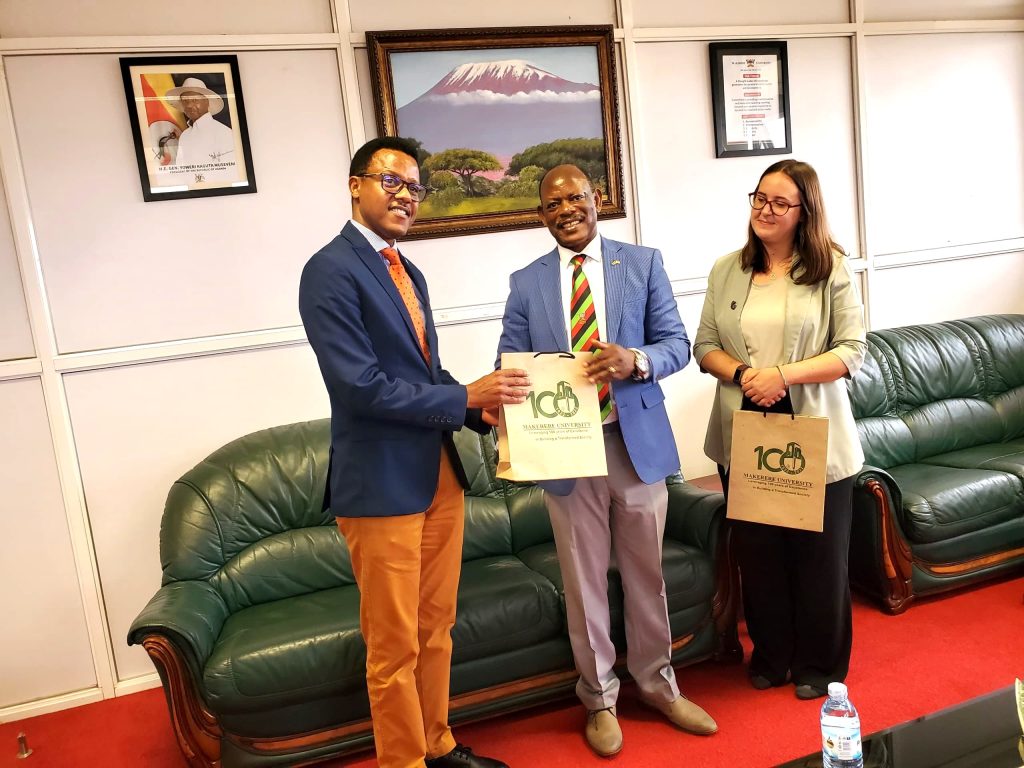
About the College of Forestry, Oregon State University
The Oregon State University College of Forestry is an internationally recognized leader that is transforming education, research and policy for managing and sustaining working forest ecosystems in the 21st century. The College offers a world-class education that provides a wide variety of opportunities following graduation. Academic excellence is the hallmark of the College of Forestry programs at Oregon State University. Ranked as one of the premier forestry schools in the world, students find a variety of programs that offer broad education, rigorous depth and professional focus. The College is known for its collaborative research approach to advance knowledge and bring solutions to issues facing forest landscapes and ecosystems. It takes pride in creating new and innovative approaches to help partners enhance people’s lives while improving the health of lands, businesses and vital ecosystems.
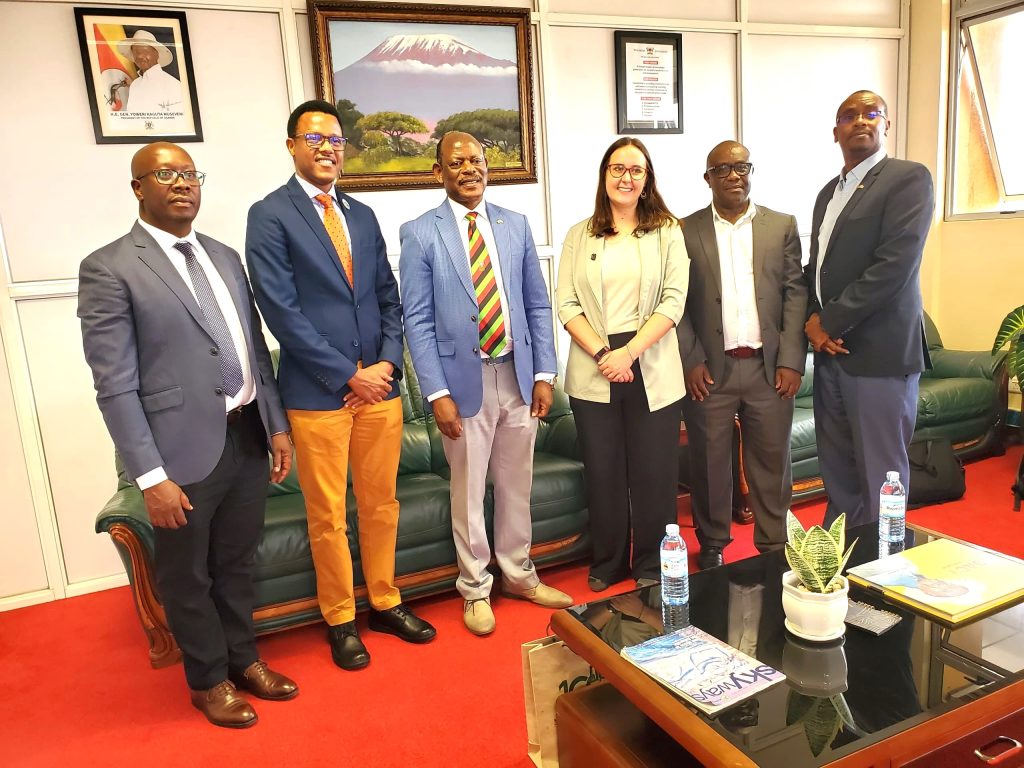
Agriculture & Environment
Call For Abstracts: 3rd International GORILLA Conference
Published
1 week agoon
July 19, 2024By
Mak Editor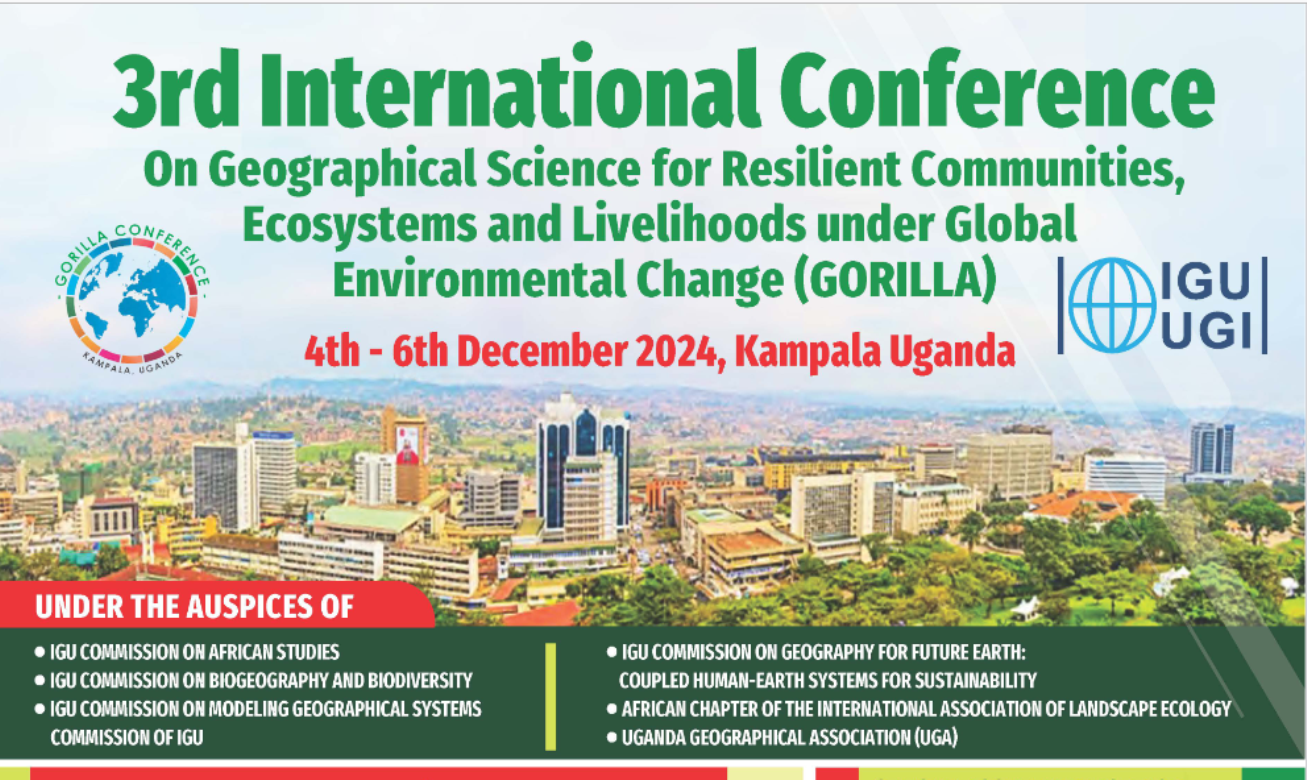
The 3rd International Conference on Geographical Science for Resilient Communities, Ecosystems and Livelihoods under Global Environmental Change (GORILLA) aims to take stock of emerging geographic oriented science and knowledge for advancing the 2030 Agenda for Sustainable Development. The GORILLA Conference seeks to harness geographic science to advance knowledge and foster positive change in understanding and addressing sustainable development challenges and opportunities at local, regional, national, and global scales. The specific objectives are to;
- Facilitate exchange of contemporary resilience building knowledge and innovations in a transdisciplinary manner.
- Enhance dialogue to bridge the science-policy-practice interface to address deficits that are limiting the resolution of pressing resilience challenges and shape policy agendas.
- Enhance capacities and capabilities of early career scientists through mentorship and dedicated training focused on the 2030 Agenda for Sustainable Development.
- Increase knowledge and scientific outputs from Sub-Saharan Africa by facilitating special issue publications
- Provide an opportunity for increased networking and beneficial partnerships from attendees with varied backgrounds and professional affiliations to address complex sustainable development challenges.
Important dates
- Conference Dates: 4th – 6th December 2024
- Deadline for Submission of Abstracts: 30th August 2024
- Latest Notification of Abstract Acceptance: 31st October 2024
Conference Topics
(a) Geographies of Climate Change, Climate Justice and Just Transition: Spaces and Patterns
(b) Biodiversity Informatics, Sustainable Ecosystems, Landscapes and People
(c) Green Growth and Transitions to Land Degradation Neutrality and Net Zero
(d) Water Governance and Watershed Resilience for Sustainable livelihoods
(e) Interconnected Geohazards and Disasters in a Changing World
(f) Polycrisis: Migration, Displacement, Conflict and Humanitarianism
(g) The changing Geography of Agrifood Systems
(h) Nature Based Solutions for Inclusive and Equitable Development
(i) Emerging and Novel Technologies for Societal Resilience
(j) Sustainable Cities and Urban Systems in SSA
(k) Geographies of Energy and Energy Transitions
(l) Environment and Health
Submission of Abstract
A 250-word abstract on the topics of the conference is required for those intending to make presentations. Both oral and poster presentations in the conference will be accepted. In addition, specific proposals for sessions may also be accepted. Abstracts will be submitted online at https://gorilla.mak.ac.ug.
Please see downloads for Conference Materials
Trending
-
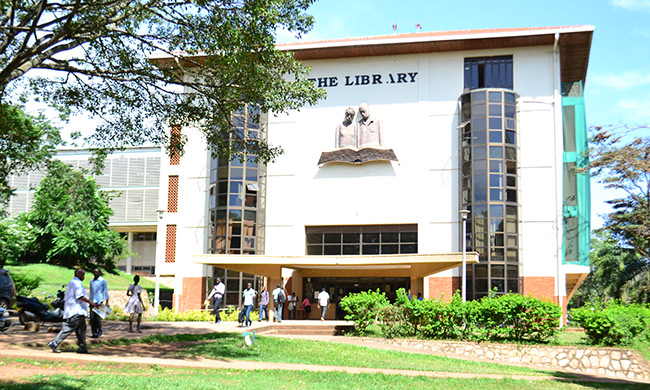
 General1 week ago
General1 week agoDiploma/Degree Holders Admission Lists 2024/25
-
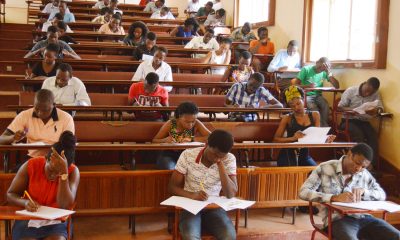
 General1 week ago
General1 week agoAdvert: Mature Age Entry Scheme – Private Sponsorship 2024/2025
-
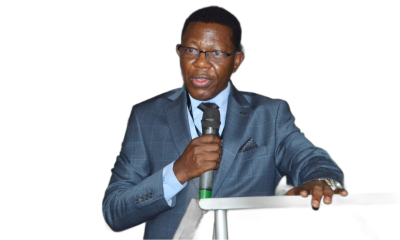
 General5 days ago
General5 days agoProf. Buyinza Mukadasi Appointed Acting DVC Academic Affairs
-
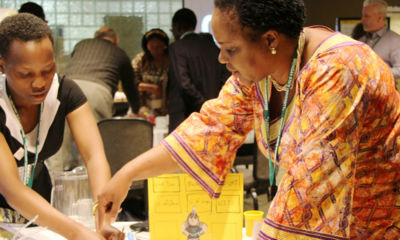
 General1 week ago
General1 week agoAfrican Futures Research Leadership Program: Cohort 5 – Call for Scholars
-
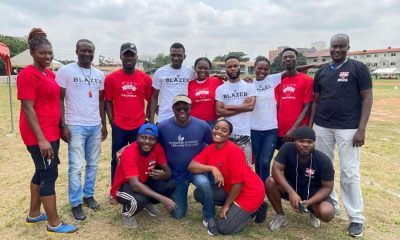
 General1 week ago
General1 week agoNow Open: CADFP Project Requests
